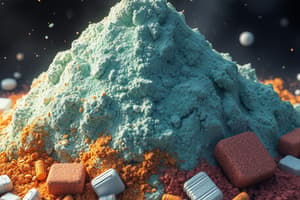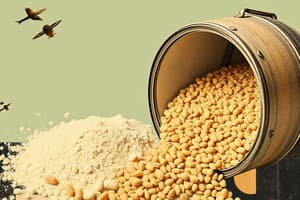Podcast
Questions and Answers
What is the primary reason powders are utilized in clinical studies of drug preparations?
What is the primary reason powders are utilized in clinical studies of drug preparations?
- They are easier to store than other forms.
- They have a longer shelf life than tablets.
- They are more palatable for patients.
- They allow precise alterations in dosage. (correct)
Which of the following is NOT a traditional mode of administration for powders?
Which of the following is NOT a traditional mode of administration for powders?
- Insufflation into a body cavity.
- Oral intake as snuffs.
- Inhalation as a vapor. (correct)
- Application to external areas.
What contributes to the appeal of powders as a dosage form?
What contributes to the appeal of powders as a dosage form?
- They facilitate custom dosing for patients easily. (correct)
- They remain effective longer than liquid forms.
- They are universally applicable for all medications.
- They can be manufactured with less technology.
How do granules differ from powders in pharmaceuticals?
How do granules differ from powders in pharmaceuticals?
Which application of powders allows prolonged drug effect through adhesive properties?
Which application of powders allows prolonged drug effect through adhesive properties?
What is the primary concern regarding the storage of powders with different particle sizes?
What is the primary concern regarding the storage of powders with different particle sizes?
Why should topical powders not use highly sorptive powders on oozing wounds?
Why should topical powders not use highly sorptive powders on oozing wounds?
What is a desirable property of topical powders in relation to particle size?
What is a desirable property of topical powders in relation to particle size?
What effect does a smaller particle size have on the dissolution rate of powders?
What effect does a smaller particle size have on the dissolution rate of powders?
What is the role of a water-repellent powder in topical applications?
What is the role of a water-repellent powder in topical applications?
Flashcards are hidden until you start studying
Study Notes
Introduction
- Powders are a solid dosage form composed of finely divided particles.
- Powders can be used internally (oral powder) or externally (topical powder).
Historical Use
- Historically, powders have been used as internal and external medications.
- Internal uses include oral administration, nasal administration (snuffs), and insufflation into body cavities.
- External uses include application to compromised skin areas.
- Powders are used to make solutions for topical, oral, and douche applications.
- Recent advancements include bioadhesive powders that adhere to specific areas for prolonged drug effects.
Applications
- Powders allow for easy dose adjustments by a primary care provider compared to capsules or tablets.
- Powders facilitate clinical studies due to the flexibility in dose adjustments.
- While medicated powders are limited in therapeutics, powdered substances are widely used in preparing other dosage forms.
Powders: Composition
- Well-prepared powders have uniform, small particle sizes for an elegant appearance.
- Powders are typically more stable than liquid dosage forms and dissolve rapidly, allowing for quick drug absorption.
- Particle size affects powder properties. Larger, denser particles settle faster than smaller particles; bulky particles settle slower.
- Powder stability is influenced by large surface area exposed to atmospheric conditions. Powders should be stored in tight containers.
- Smaller particle sizes present a greater surface area and can adsorb gases, affecting wetting properties.
- Increased surface free energy can enhance drug solubility and bioequivalence.
Topical Powders
- Topical powders should have a uniform, small particle size to avoid skin irritation.
- Ideal topical powders are impalpable, free-flowing, adherent, and passed through a No. 100-mesh sieve to minimize irritation.
- Highly sorptive powders are not suitable for oozing wounds, as they can form crusts.
- Water-repellent powders prevent water loss from the skin and avoid caking on oozing surfaces.
- Talc and other natural products used on open wounds should be sterilized to prevent infection.
- Topical powders typically contain a base (cornstarch or talc), an adherent (magnesium, calcium, or zinc stearate), an active ingredient, and an aromatic material.
- Powders should flow easily, spread uniformly, and provide a large surface area for absorbing perspiration and cooling sensation.
Insufflated Powders
- Insufflated powders are finely divided powders intended to be administered into body cavities using a device.
- Common uses include nasal and vaginal application.
- Powders for insufflation require careful formulation to avoid irritation and ensure proper delivery.
- Particle size is crucial for proper insufflation and drug delivery to the target site.
- Insufflated powders should be free-flowing and adhere to the target site.
- Common examples include nasal corticosteroids, antifungal medications, and antihistamines.
Granules
- Granules are prepared agglomerates of powdered materials.
- They can be used directly for their medicinal value or as a pharmaceutical ingredient.
- Granulation improves powder flowability, compressibility, and dissolution properties.
- Granules are often used in tablet formulation.
Advantages of Powders
- Easy dose adjustments.
- Simple formulation process.
- Relatively stable.
- Rapid dissolution and absorption.
Disadvantages of Powders
- Potential for particle size variation.
- Sensitivity to moisture and humidity.
- Difficulty in handling and dispensing.
- Potential for dust generation.
- Potential for drug degradation due to large surface area.
Studying That Suits You
Use AI to generate personalized quizzes and flashcards to suit your learning preferences.




